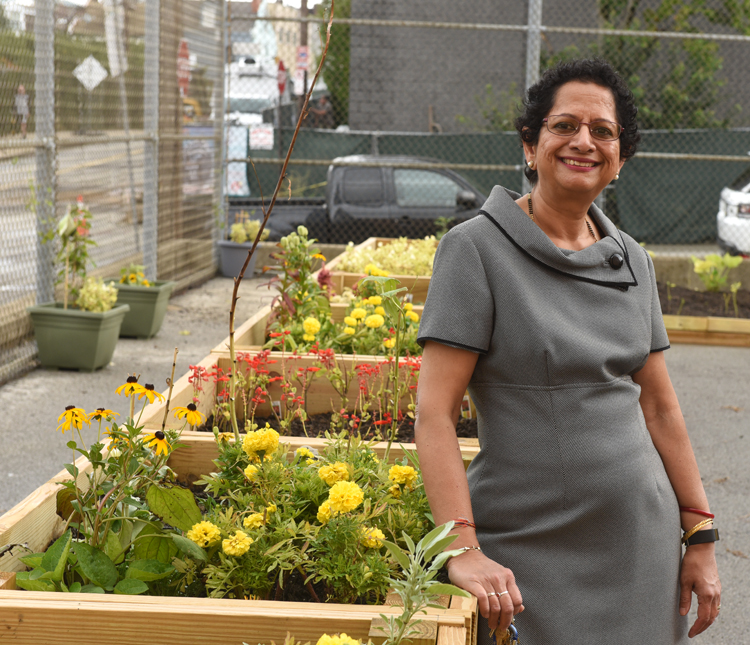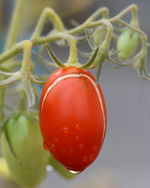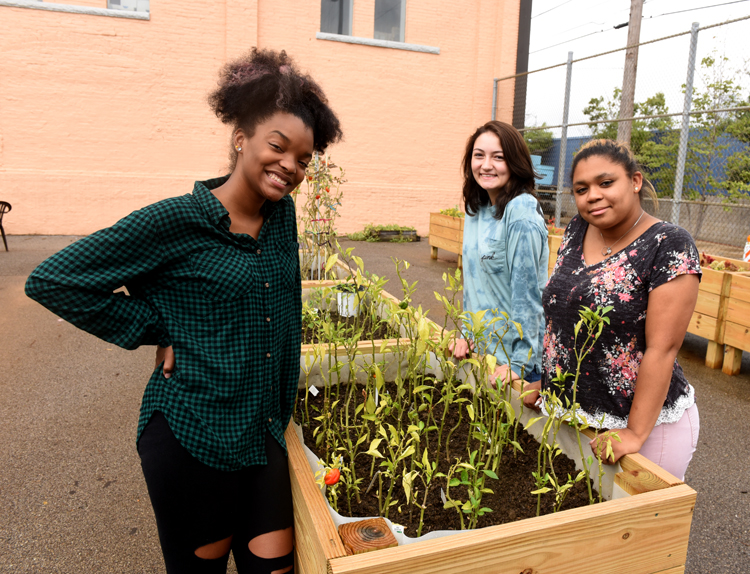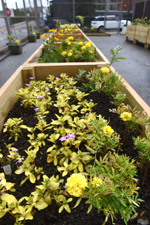UPMC South Side garden provides therapy for kids
Posted on: September 5, 2018 | Written By: Doug Oster |
In Pittsburgh’s South Side neighborhood, there’s a garden of raised wooden beds enclosed by a tall, chain link fence. Three 16-year-old girls struggling with anxiety, depression and other issues are just a few of the patients who use this space at the Western Psychiatric Institute and Clinic of UPMC as a therapeutic tool.

Dr. Rameshwari V. Tumuluru is medical director of the Adolescent Partial and IOP Program at the Western Psychiatric Institute and Clinic of UPMC. She is using a garden as a therapeutic tool for children. Photos by Doug Oster
 Dr. Rameshwari V. Tumuluru is medical director of the Adolescent Partial and IOP Program at the clinic and one of the forces behind the garden, which helps kids from 12 to 18 years old who have emotional and psychiatric illnesses.
Dr. Rameshwari V. Tumuluru is medical director of the Adolescent Partial and IOP Program at the clinic and one of the forces behind the garden, which helps kids from 12 to 18 years old who have emotional and psychiatric illnesses.
“We need to involve the children in their treatment,” she says. “It’s a way for the body and mind to reconnect.”
The Mindfulness Program incorporates the garden as a key tool for treatment.
“Mindfulness is a state in which you are able to let things happen around you without reacting and without judging yourself,” Tumuluru says. “Kids judge themselves; there’s an incessant chatter inside their heads, incessant chatter around them.”
By spending time in the garden, she says, stress is decreased along with soothing negative thoughts.
The garden was funded by the Beckwith Foundation, something that Tumuluru is grateful for.
“The grant is a gift that keeps on giving,” she says. “It brings so much joy to everyone and so much calm.”

Camille D., Sarah M. and Sarah S. all are using the garden at the Western Psychiatric Institute and Clinic of UPMC as a therapeutic tool.
 Sarah M., one of the 16-year-olds in treatment, was thrilled when she found out the garden would be part of her therapy.
Sarah M., one of the 16-year-olds in treatment, was thrilled when she found out the garden would be part of her therapy.
“I was excited. I love gardens. I love plants. They make me feel better and make me happy,” she says with a smile.
One of her jobs was introducing worms into the soil.
“That was pretty fun. I named a worm actually Eduardo,” Sarah says with a laugh. “I feel like everyone had fun doing it.”
Sarah S. is another patient who suffers from depression, anxiety and PTSD. She had never worked in a garden before, but warmed up quickly, in more than one way.
“It was relaxing, using your senses, it took my mind off what I was anxious about,” she says.
On her first day she decided to try a hot pepper straight out of the garden.
“I ate the whole thing and it was good. The second one messed me up,” she says, laughing. “I feel like it makes me realize the beauty of life. It’s opened my eyes to what else could be out there.”
She’s hooked on gardening and wants to plant some strawberries at home.
“It gives them a sense of self belonging in a community, working with each other while being non-judgmental,” Tumuluru says.
The garden is also a place used by staff and adults under treatment as a respite.
“The garden doesn’t belong to me,” she says with smile. “It belongs to everyone, it was a community project.”
Other staff helped with the design, building and maintenance of the garden. There are a lot of lessons being taught in the space too — the kids made a friendship salad with produce from the garden as a way to teach them to eat mindfully and without judgment. This was especially helpful for patients dealing with eating disorders.
“In nature, nothing is perfect,” Tumuluru adds. “That’s why you need to accept the differences in each other and feel like you don’t need to be perfect.”
As the summer crops fade, spinach, Swiss chard and other cool weather varieties will be planted to keep the garden going into the fall. Sitting at her desk, Tumuluru reads a letter written by one of her young patients.
“‘I love the garden because it makes me feel calm and relaxed. For me the garden is a wonderful place to be when you struggle with your issues. It inspired me to start a garden of my own, so smile.’”
As the doctor puts down the handwritten testimonial on her desk she says, “When I read it, I was very touched.”
She has seen wonderful results from the kids who have been in the garden, and it’s been a transformative experience for many patients.
“The best thing for me is going outside and watching the kids and staff talk and walk and enjoying themselves,” Tumuluru says. “It’s an opportunity for kids to be kids. The work of childhood is play.”
Camille D. is another 16-year-old patient who has gardened with her mother and grandmother. She has issues with anxiety, depression and OCD and oftentimes struggles with her problems before getting into the garden.
“Once I come out here and become mindful of everything that’s going on outside this fence, listening to the construction, watching the people walk by, listening to car music, it allows me to know that I am part of this world and that I do fit in,” she says. “It just relieves all the negative emotion that I was feeling before.”
Doug Oster is editor of Everybody Gardens, a website operated by 535Media, LLC. Reach him at 412-965-3278 or doster@535mediallc.com. See other stories, videos, blogs, tips and more at everybodygardens.com.
Details: UPMC.com
This is part of an occasional series on gardeners faced with challenges.
Here’s part one about John Staudacher who is gardening with Parkinson’s disease
This is part two about 9-year-old Reid Hall, who gardens with his family from his wheelchair.